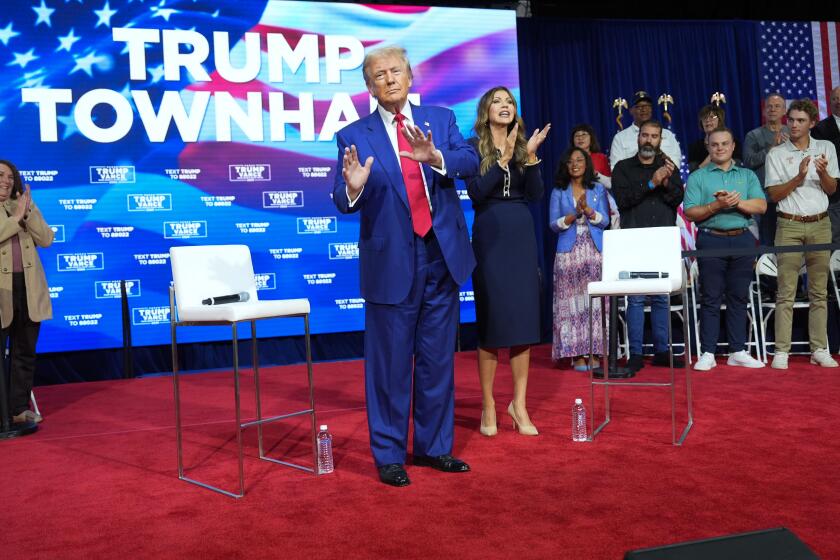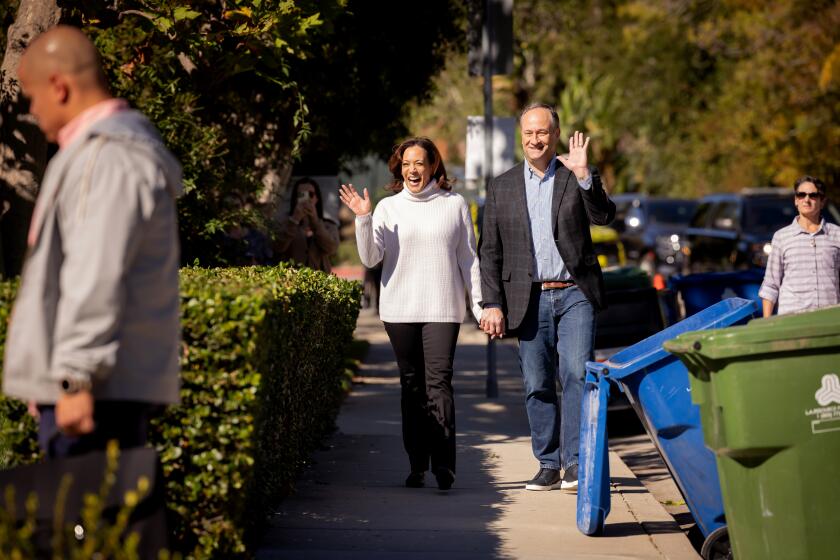Campaign Marathons and Juggling Families
On September 28, I announced that I would not run for President. Nonetheless, I learned valuable lessons--about the perceptions surrounding presidential campaigns, the process of running and the issues that Americans want presidential candidates to address.
I offer these lessons to American voters, women elected officials and the Democratic Party.
First is a perception that presidential candidates can only run with a cadre of Washington wonders. Wrong. There are thousands of bright, creative and energetic people beyond the Potomac, eager to reshape U.S. politics.
These politically savvy workers have never worked in a presidential campaign but they have organized people around environmental, peace, women’s and labor issues. The skills they have honed are transferable to presidential politics--and they are ready to take politics back from the pollsters and packagers.
The network of state and local elected officials is thriving; some of my greatest resources were women elected officials. For example, in Minnesota, Lt. Gov. Marlene Johnson and Secretary of State Joan A. Growe arranged a reception for potential supporters: 600 invitations were sent; 1,200 people attended. Growe and Johnson steered me toward contributors and organizing talent in Minnesota.
Second is a perception that women have to be more competent, more qualified and more conservative than men to be a national candidate.
During my 15 years in Congress I felt I had a record to prove my competency and was eager to defend that record. Yet questions from potential supporters and the press tended to be focused on things other than issues: my husband’s plans for his White House years, my brother’s neighborhood, my daughter’s clothes and clubs I belonged to in high school. And of course the question of the summer, “Why are you running as a woman?”
Granted, there have not been many women who have run for high national office but must we treat those who do as a novelty act? The conventional wisdom is that if women are going to play the game, they are going to have to play by the rules. And while some rules may be stupid and sexist, they are the rules. Hogwash. Women are in politics to make our communities, our country and our world a better place to live for our children and grandchildren. If it takes changing the rules to do that, we must take on that challenge. One way to accept that challenge is to take another look at the political process and make it more accessible to voters.
Campaigns start too soon. There is something wrong with a system impelling candidates to campaign virtually non-stop for two years. Not only is it boring but it also tends to trivialize the candidates. So this summer we were “Snow White and the Seven Dwarfs” and “flavors of the week.” A long campaign is also expensive, making the candidate’s major task the raising of money, not the raising of issues. The presidential campaign season should begin in October of the pre-election year, after the World Series. A shorter campaign will invigorate everyone.
Then, parties have to do a better job educating the public about the presidential election process. Many of my supporters were eager to fight for new policies but were new to the process. A week after my decision not to run, I went to New Mexico to address a regional convention of senior citizens. They asked me, “Why did you drop out? I would have voted for you. My entire seniors group would have voted for you. You could have won.” I had to explain that unfortunately their popular support wouldn’t translate into being the party’s nominee unless I had a slate of delegates in each state and a team of lawyers deciphering each state’s rules on delegate selection. The intricate rules overwhelmed and intimidated all of us.
The Democratic Party must activate those people to win in 1988. I think the summer achievement I am most proud of is bringing about 15,000 new people into the process. Letters from contributors and supporters often said, “I have never voted before but . . . . “ or “I have always hated politics but . . . . “ We need to reach out, to rekindle the hopes and spark the interests of independents and latent Democrats by making the process more accessible.
What made the summer worthwhile was hearing the American people yearn for straight talk on the issues. Issues were the catalyst for--and purpose of--my presidential exploration.
Americans are ready for a rendezvous with reality. If we don’t deal with the facts we will be mugged by reality and robbed of our rendezvous with opportunity.
This country is tottering on the brink of an economic disaster. The question is not who will rearrange deck chairs on the Titanic, but who will lead the great ship around the iceberg.
My travels confirmed a belief that the deficit is Public Enemy No. 1. People won’t stand for government squander-mania and are calling for leadership on tough budgetary choices.
One serious problem is that the American flag is stretched too thin. America stands tall--sending troops, ships and money--but stands alone. This summer I advocated sharing the burden of Free World defense with our allies.
It is time to come to terms with the defense burdens we carry for other nations. It is not 1945, but 1987. Japan and our European allies are now major economic powers. It’s time they begin paying their fair share for their own defense. With the deficit looming over us, the United States cannot sustain economic competition with allies and military competition with the Soviets while trying to remain strong and competitive.
The biggest response I received on the road, however, was on my call for a progressive national family policy that strikes balances among the federal government, the state governments, business, communities and families.
Americans are concerned with what is happening to their families--from college campuses to senior citizens, from Maine to Oregon. The family is our primary social and economic unit, the basic building block of society. We have become a nation of two income families, of single parent families, of blended families--a nation of families under stress.
We juggle jobs, schedules, parenting, family obligations, household budgets and free time to give our children the best lives possible. Families have become master jugglers because of harsh economic realities--spiraling costs and declining wages. Since 1973, the average income for families with children declined by 3.5%. Families are borrowing more money today than ever before to make ends meet; 65% of U.S. households are in debt and 55% owe more than they own in financial assets.
Dr. T. Berry Brazelton, a Harvard pediatrician, has called young families the new silent generation. He says that when he speaks to parents, he is amazed at the fervor and energy with which they ask about child-rearing.
Parents, however, are so busy figuring out who cooks dinner tonight, how to make last-minute child-care arrangements, how to prepare the sales report due tomorrow, that they haven’t time to figure out how public policy affects them, much less how to get out there and participate.
That’s why I call Family legislation the moonshot goal of the ‘80s and ‘90s. It’s a national challenge as well as a national aspiration.
I will keep speaking on important issues. I have formed a political committee, the Schroeder Fund for the Future, to advocate family and defense policy.
I will lead a burden-sharing panel for the House Armed Services Committee, to study the defense needs and resources of the United States and our allies.
And together with Berry Brazelton and Gary David Goldberg, executive producer of “Family Ties,” I will participate in the Great American Family Tour. We will hold forums in several cities, giving parents and grandparents information on child development and family policy. We will also help them to organize and advocate on their own.
My run may have been a fleeting moment in the history of the 1988 elections, but I hope its lessons will help in reshaping American politics for the 21st Century.
More to Read
Get the L.A. Times Politics newsletter
Deeply reported insights into legislation, politics and policy from Sacramento, Washington and beyond. In your inbox three times per week.
You may occasionally receive promotional content from the Los Angeles Times.










